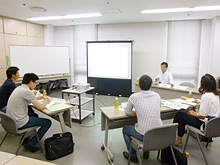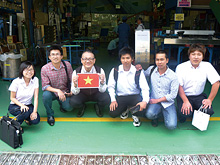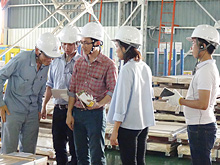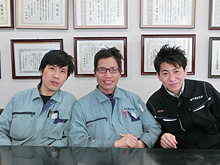A seminar program lasting 10 days Understanding the importance of management philosophy and the true meaning of 3S activities! Management Training Program for Vietnamese Staff Working at SMEs
This seminar nurtures managers and is aimed at Vietnamese company employees. The participants learn about the importance of management philosophy, the reasons for focusing on Kaizen efforts, and ways of thinking at the root of Japanese corporate management, such as teamwork, so that Vietnamese employees can be tasked as leaders at overseas bases, factories and other leadership positions. We introduce the 10-day program here.
This seminar nurtures managers and is aimed at Vietnamese company employees. The participants learn about the importance of management philosophy, the reasons for focusing on Kaizen efforts, and ways of thinking at the root of Japanese corporate management, such as teamwork, so that Vietnamese employees can be tasked as leaders at overseas bases, factories and other leadership positions. We introduce the 10-day program here.
Day 1: Introduction
- Orientation, establishing issues
- After explanations are given on the program’s outline and flow, the perspectives that should be appreciated in the seminar are established, based on the participants’ awareness of the problems.
- Special features of Japan’s competitive SMEs
- Efforts concerning management, Kaizen and human-resource development are introduced in a general way.

Day 2: Management philosophy
- Management based on a management philosophy
- The meaning of management philosophy, why it is important and how it is reflected and demonstrated at Japanese companies are introduced.
- Management philosophy (involving company visits)
- Participants visit history museums of companies that are representative of Japan.
- There, they are introduced to the management philosophy deemed important by the companies’ founders and the kind of management styles based on those philosophies.
Days 3, 4, 5:
- Getting to know Kaizen
- Case studies on Kaizen are introduced, after an explanation of what Kaizen is and why Japanese companies put stress on it.
- Special features of Japanese quality control and the reasons for them
- Explanations of quality control by all the company members, TQC/small group activities and case studies on quality-improvement activities
- 5S (organization, orderliness, cleanliness, hygiene and discipline)
- Explanations on what 5S means, the reasons and objectives of 5S efforts by Japanese companies and case studies on 5S activities
- 3S activities by all company members (involving company visits)
- Explanations by the executives of companies where all the members are engaged in 3S activities, and participants’ understanding is deepened by field trips at sites where the measures are taking place

Days 6, 7: Organizational management
- Stress on teamwork over individuals
- Explanation concerning teamwork for Japanese people. Explanation on how targets, desire and communication can enhance teamwork
- Motivation not strictly dependent on money
- Explanations on extrinsic and immanent motivation, and on the importance on enhancing motivation by consent
- Small group activities, proposal activities (involving company visits)
- Visits to companies involved in internal activation by small-group activities and proposal activities. Explanations from company executives, opinion exchanges with workers and on-site inspections
- Target management systems
- Explanations on what target management means together with case studies where target management has been demonstrated
Days 8, 9: Human-resource development
- Human-resource development from a long-term perspective
- Explanations of the role of leaders at Japanese companies, career formation by systematic education, methods of nurturing leaders
- Handing down of technology and skills
- Explanations on the promotion of the standardization of work operations and how technologies and skills can be passed from seniors to juniors
- Human-resource development and worker satisfaction (involving company visits)
- Visits to companies demonstrating management that centers on human development, such as nurturing workers and worker satisfaction. Explanations from company executives, opinion exchanges with workers and inspections of worksites

Day 10: Rounding up
- Presenting results
Announcement of things learned during the seminars, things realized and future aspirations
<Voices from companies that took part> Overseas development through activities by Vietnamese employees
We currently employ 13 Vietnamese people in Japan and Vietnam. The management of our Vietnamese office is basically entrusted to two Vietnamese employees who took up their posts in 2014 after working at the headquarters in Japan. The Vietnamese employees are indispensable for our expansion in Vietnam. Three of them have participated in PREX seminars to date. I feel that afterward, they underwent a big change, developing the consciousness of a leader. In the launch stage of an overseas base, the president must go and serve at the location. But it is necessary for Vietnamese people to be nurtured as managers and do the localization, when you consider the local personal connections and relationships. Our company hired Vietnamese employees, trained them and went ahead with a method of expanding to Vietnam placing them at the base. When human resources are employed in this way, it seems to be a smooth approach for SMEs for tackling their overseas expansion.
(Daisuke Nishijima, President, Nakano Manufacture Co., Ltd. (right))
Voices from seminar participants
I am utilizing the things learned during the seminars, including providing work guidance methods to subordinates, production planning, ways of communicating, 5S activities and figuring out the causes of things that go wrong.
When I don’t make efforts, other members won’t understand things. As I have been put in charge, I am taking the initiative and thinking about good methods.

Please send e-mail if you haven any inquiry.
prexhrd-pr@prex-hrd.or.jp


